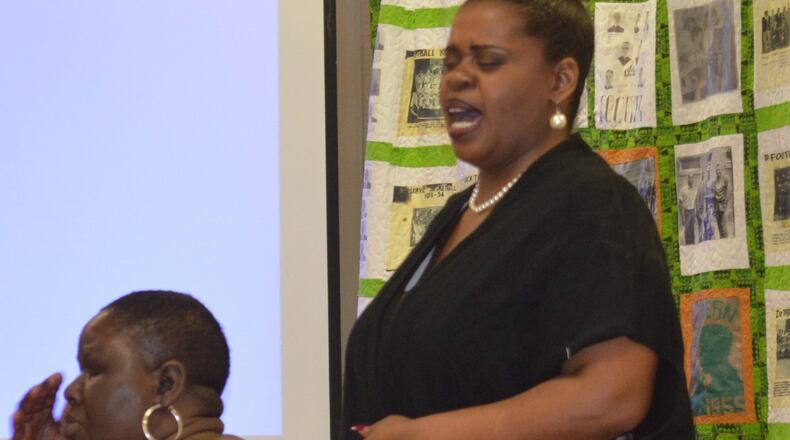MORE: Black History Month events in Butler County
Their five interpreters began the program standing behind a table and stirring bowls of clear water, which changed into various colors.
Each, then, took a turn at the microphone talking about the woman from history they represented, either by telling the story of that woman or speaking in the first person as that woman telling her own story.
Barbara Cox spoke of Madam CJ Walker, who was born Sarah Breedlove, a free child two years after the end of the Civil War and was orphaned at the age of 7. She went to live with her sister and her husband but was forced to work as a servant in the house until running away at age 14 and then marrying Moses McWilliams. At age 17, she gave birth to her only child Lelah and her husband died—likely lynched, Cox said—and she later moved to St. Louis, where she struggled to provide for herself and her daughter.
She married her second husband, who was abusive and that caused her hair to fall out. She found a product that would make hair grow and later married Charles Joseph Walker, changing her name to that by which she is best known, Madam CJ Walker.
She was acknowledged as a great salesperson in 1908, having earned $9,000 to that point in her career, an impressive sum for a black woman in those days.
She moved to Indianapolis and opened a factory to produce her hair-growth product, employed others and died in 1919 at the age of 51, having earned a half-million dollars in her life and with holdings well over $1 million.
Rosa Parks made her entrance into the evening’s program in the person who Dr. Angela Davis who told Parks’ story in the first person, explaining what happened that Dec. 1, 1955 in Montgomery, Alabama when she refused to yield her seat on a bus to a white person.
Parks/Davis explained she had worked as a seamstress until 6 p.m. that day and paid her fare to ride the bus home, taking a seat in the first row of the “colored section.” When more whites filled the front of the bus, the driver came back to her to make her stand.
“Something came over me. Determination covered me like a quilt. He said, ‘Make it easy on yourself. Move.’ I moved…from the seat on the aisle to the seat by the window. He said he would call the police and they came and arrested me,” she said. “I was not physically tired. I was not old. I was 42 at the time. I was tired of giving in.”
That set off the 382-day Montgomery bus boycott, which ended when the city lifted required segregation on buses. Parks lost her job and later moved to Detroit and was an aide to Congressman John Conyers. After her death, Rosa Parks was the first woman to lie in state in the U.S. Capitol.
Harriett Tubman was the subject of the Rev. Regina Phillips, who said Tubman was born a slave between 1822 and 1824, the range due to the fact slave births were not recorded. She was subject to blackouts all her life because her master threw something weighing two pounds at her while she was still young. She had supernatural strength and was humiliated when her master forced her to pull a wagon for the entertainment of guests.
At that point, she became determined to escape which she did and then made 13 trips north helping slaves escape through the Underground Railroad.
“She said she never lost a slave and her railroad never went off the rails,” Phillips said of Tubman, who was the subject of wanted posters offering rewards equivalent to millions of today’s dollars.
It was announced last April that Tubman would be the first woman who would appear on a U.S. $20 bill.
Carol Braddock presented the life of Maya Angelou predominantly reading two of Angelou’s poems—one from her early works and one later in life.
The first worked around the theme, “Still, I Rise” while the second around “Phenomenal Woman.”
Angelou wrote seven autobiographical books.
“She wrote the book on autobiographies,” Braddock said of her. “She said her greatest strength was patience.”
Her first book, “I Know Why the Caged Bird Sings,” is her best-known work and her final book, released in 2013 completes the story of her life, coming after having lived in Ghana.
BLACK HISTORY MONTH: Ida B. Wells, journalism giant
The story of singer Marion Anderson was told by Lloyce Jefferson, who noted by age 2 or 3, Anderson was playing a miniature piano and grew up in a diverse neighborhood with Jews, blacks, Italians and Irish and played with all races. Her father died when she was 12 and an aunt encouraged her to sing.
As her notoriety grew, she traveled around the country, but was introduced to Jim Crow laws in the South was not permitted to stay in hotels or eat in restaurants because of her race. She became renowned in Europe and Russia.
She later became the first black to sing in the Metropolitan Opera House and got to sing in a free concert on the National Mall before 75,000 people. Anderson died in 1993 at age 95.
Jefferson closed her comments saying Anderson’s favorite song was “He’s Got the Whole World in His Hands” and then invited to audience to sing it along with her.
BLACK HISTORY MONTH: Faye Wattleton champions for women’s rights and health care
The evening’s program closed with Miami student Kiyaa Bowens singing in the place of Mahalia Jackson in a spiritual piece including the lines: “Soon I will be done/ Trouble of this old world/ Soon be going home to live with the Lord.
She then led the audience in singing the National Anthem and the Negro National Anthem.
About the Author
